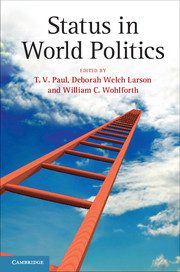Book contents
- Frontmatter
- Contents
- Figures
- Tables
- Contributors
- Acknowledgments
- Part I Introduction
- Part II Admission into the Great-Power Club
- Part III Status Signaling
- 5 Status Dilemmas and Interstate Conflict
- 6 Status Signaling, Multiple Audiences, and China’s Blue-Water Naval Ambition
- Part IV International Institutions and Status
- Part V Status, Authority, and Structure
- Part VI Conclusions
- Index
- References
5 - Status Dilemmas and Interstate Conflict
Published online by Cambridge University Press: 05 June 2014
- Frontmatter
- Contents
- Figures
- Tables
- Contributors
- Acknowledgments
- Part I Introduction
- Part II Admission into the Great-Power Club
- Part III Status Signaling
- 5 Status Dilemmas and Interstate Conflict
- 6 Status Signaling, Multiple Audiences, and China’s Blue-Water Naval Ambition
- Part IV International Institutions and Status
- Part V Status, Authority, and Structure
- Part VI Conclusions
- Index
- References
Summary
A rising China seeks the status of a great power second to none in a multipolar world. A developing China wants to retain the status of a poor country, a proud member of the Group of 77 (G77), resisting attempts to accord it developed country status. The United States is the “indispensable nation,” the world’s Number One, whose proper role in all global endeavors is that of the leader. Washington is a coequal partner with all other major powers, “leading from behind” and no longer seeking a special role. Which of these stories about status is true? Is a rising China challenging or seeking equality with the United States? Or is the real problem China’s lack of status aspirations and penchant for free riding? And is the United States, for its part, clinging to sole superpower status or desperately seeking to be seen as on par with other great powers? There is evidence for all of these stories because officials in Beijing and Washington send different signals about their status to different audiences at different times, as the situation seems to demand. As a result, the real state of their mutual status politics remains uncertain.
The process of signaling and recognizing status claims is at least as subject to uncertainty and complex strategic incentives as are the security politics with which scholars of international politics are familiar. Some proportion of the conflictual behavior of states may thus derive from their inability to signal status claims. That is, status conflict may occur among states that would be satisfied with their status if only they could obtain an accurate estimate of it. Or, very costly conflict may occur in a system of states whose beliefs about each other’s statuses are only minimally inconsistent. Just as the security dilemma may foster or amplify conflict among states that seek only security, so might a status dilemma create or amplify conflict among states that seek only to maintain their relative standing.
- Type
- Chapter
- Information
- Status in World Politics , pp. 115 - 140Publisher: Cambridge University PressPrint publication year: 2014
References
- 10
- Cited by



